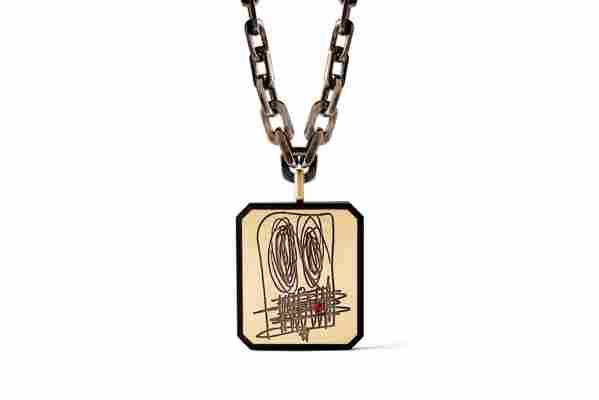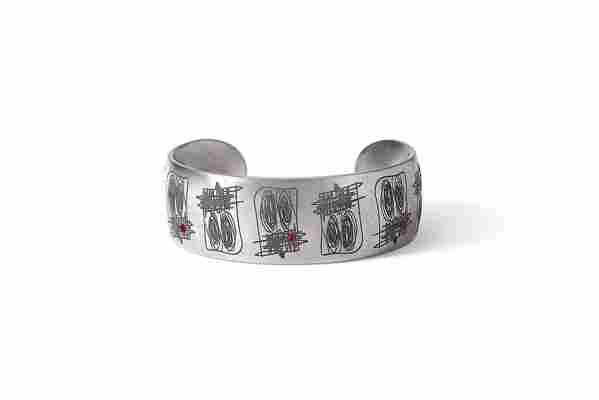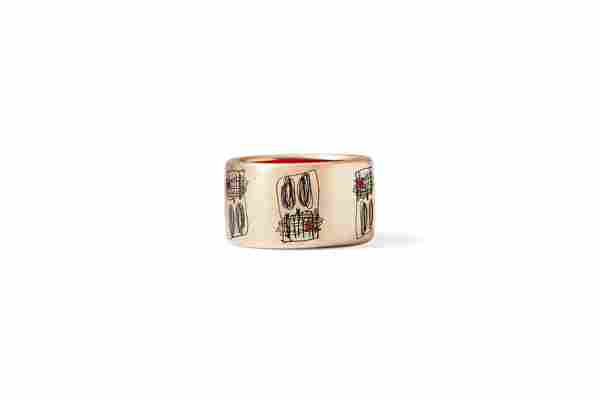Rashid Johnson and Liz Swig Debut a New Jewelry Line for a Pair of Worthy Causes
“I am totally interested in the jewelry space, but this is the first time I’ve ever actually designed jewelry!” So says Rashid Johnson, the influential artist and filmmaker whose mostly conceptual oeuvre touching upon issues of race and identity has made him among the most intriguing talents working today.
The jewelry Johnson is referring to is a collaboration between himself and Liz Swig, founder of LizWorks , who has worked with a series of notable artists such as Cindy Sherman and Kara Walker to produce a covetable range of creations—from ceramics to cameos—that straddle the lines between art and objets .

A tag-like pendant from the Johnson-LizWorks line.
In Johnson’s case, the jewelry is a just-released collection of signed and numbered cuffs, rings, and tag-like pendant necklaces that give new life to his recent “Anxious Men” series of paintings . Crafted from precious metals, the limited-edition works are both beautiful and benefit causes Johnson holds dear— Prep for Prep (which places students of color in private schools) and the Black Mental Health Alliance .
Although Johnson concedes he “doesn’t see a big future for himself in jewelry,” his genre debut certainly suggests promise. The pieces are crafted from bases of nine-carat gold and brightly hued titanium, and are emblazoned with the abstract, almost scratch-like imagery that constitute the “Anxious Men” works. Some also feature gemstone details such as vibrant rubies. Johnson says the linear qualities to his designs were both purposeful and cathartic. “When I draw I use lines as a way to construct new pathways to help explore where and how we are in the world today,” the artist explains. “Lines help unpack my emotional state.”

The cuff features images inspired by Johnson's recent “Anxious Men” series.
Although the jewelry line is inspired by “Anxious Men”—and arrives following key LizWorks’ partnerships focusing on female artists—Johnson says they’re equally intended for all genders. “I don’t necessarily see them as male vehicles,” he says. “Women are just as welcome to wear them.” Swig’s take is equally egalitarian: The person she sees embracing the jewelry “has a point of view that fills the space,” Vogue recently wrote .
Despite his relative newness to previous jewelry, Johnson took a particular interest in the material elements of the design process. “Liz and I spent a lot of time talking about patinas,” he says. “My interest in texture really played a strong role in translating [my concepts] into the jewelry.”
Johnson and Swig initially conceived of this project in January; nine months later, issues around Black mental health and Black education have never felt more vital due to the COVID-19 crisis and social-justice protests. The timing, while coincidental, has not been lost on Johnson—nor has the increased importance of his line’s beneficiaries.

A Johnson and Swig–designed gold ring.
“I’ve had my own experience with anxiety in the past and I am really interested in organizations that destigmatize it and provide opportunities for treatment in communities of color,” he says. As for Prep for Prep, Johnson says the program serves a multitude of purposes beyond merely helping talented Black students find their way into elite schools.
“It evens the playing field for young bright minds,” he says, “and also creates a softer landing for these kids once they arrive in the schools. Prep for Prep gives them the proper space and agency so they’re not simply Black faces existing amid sharp white backgrounds.”